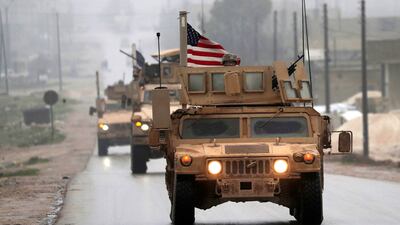The US-led Central Command and Kurdish-led Syrian Democratic Forces on Thursday denied Iranian allegations that the remaining American troops in Kurdish-controlled areas of north-eastern Syria have left.
Iranian media outlets reported that US forces have left three military bases near the Al Omar Oilfield in Deir Ez-Zur and the Qamishli District in Hassakah Province shortly after the US withdrawal from Afghanistan.
“There were no bases evacuated by US forces in Syria. There is no change to the CJTF-OIR mission in NE Syria. We remain committed to the defeat Daesh mission with our partner forces, the SDF,” Centcom said in a statement to The National, referring to the Combined Joint Task Force – Operation Inherent Resolve.
There are about 900 US service members in Syria with numbers fluctuating daily due to operational requirements, according to Centcom.
The US-led coalition to "combat terrorism" includes 44 states with the aim of "promoting peace and stability in Centcom’s area of responsibility," its website says.
In 2019, the US helped the SDF defeat and drive out most of the ISIS fighters in eastern Syria.
But the terrorist group continues to have sleeper cells in the region and has carried out several attacks against the US-backed forces and civilians.
The Pentagon established a joint task force in 2014 with allies to launch a wide-scale military operation after ISIS seized vast swathes of Iraq and Syria in lightning attacks.
The US military bases are mainly concentrated in and around Deir Ez-Zur and Hassakah.
We won’t collapse
A senior SDF officer confirmed to The National that US-led coalition troops are still functional and operate joint patrols on a daily basis in the region.
The SDF is an alliance of Kurdish and Arab militias and was founded in 2015, four years after the start of a revolution against Syrian President Bashar Al Assad. The rebellion has turned into a brutal armed civil war that killed more than 500,000 and displaced 13 million Syrians.
“The US-led coalition is crucial in degrading the capabilities of Islamic State remnants and their franchises with the same violent extremist ideology,” said Siamend Ali, a senior military leader at the SDF.
Mr Ali ruled out a repeat of what happened in Afghanistan, when the withdrawal of US troops led to the swift collapse of local armed forces.
“We have established ourselves over the past 10 years as an effective and autonomous force,” he said.
The SDF reportedly cut deals in 2019 with Russia and the Syrian government troops in anticipation of full US withdrawal.
The group aims at establishing self-rule in north-eastern Syria, but Turkey has launched several cross-border military operations against its autonomy ambitions and Ankara is also seeking to relocate about two million Syrian refugees on its soil (out of about 3.5 million) to a buffer zone inside Syria.
Ankara considers the Kurdish People’s Protection Units (YPG), which is the backbone of the SDF, a terrorist organisation as it does the Kurdistan Workers’ Party (PKK).
Turkish troops have managed to occupy a few Kurdish towns west of the Euphrates, but the presence of the American troops to the west of the river is a major deterrent.
Counterterrorism and foreign policy experts say it is vital for the US to maintain its military foothold in north-eastern Syria.
“The main focus is keeping ISIS down and limiting the reach of Assad, Russia and Iran. That’s the primary mission right now, since as the US pragmatically recognises that ISIS can regenerate if left to its own devices," says Brian Katulis, a senior fellow at American Progress, where his work focuses on US national security strategy.
"In addition, US troops on the ground give us leverage in diplomacy to end or at least tamp down Syria’s civil war – not a whole lot of leverage, but more than the nothing we’d have otherwise. It's not clear to me that there is a diplomatic strategy on the part of the US to use this leverage, but that's nothing new.”
Mr Katulis says if the US decides to withdraw all the remaining troops unilaterally in the near future, allies and security partners would see it in the context of the Afghanistan debacle as auguring a wider American retreat from engagement in the world.
"And all the more so if it’s done in the same way the Biden administration pulled out of Afghanistan," he said. "In America, terrorism remains a top foreign policy priority, but foreign policy isn’t top priority in general."








